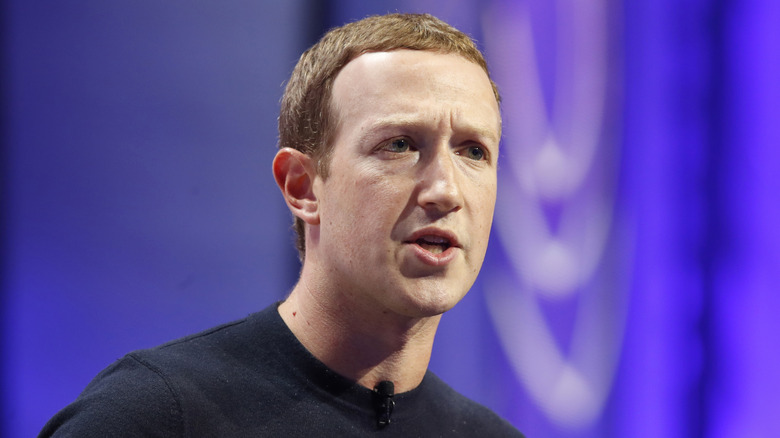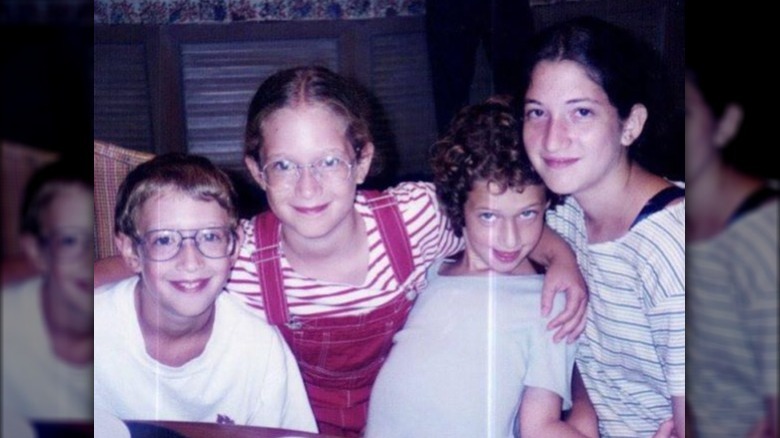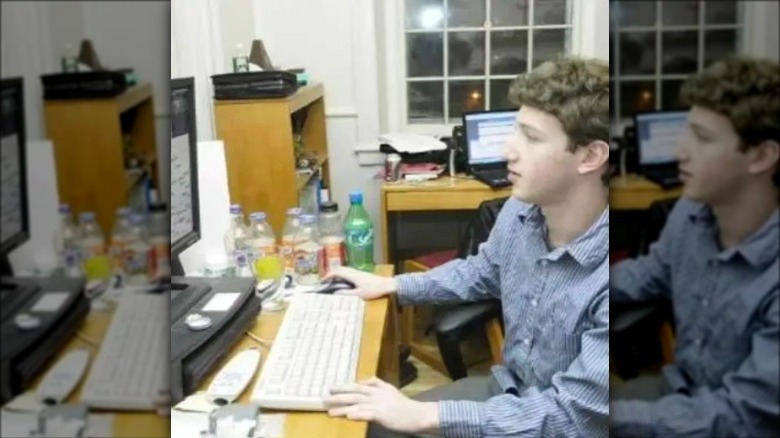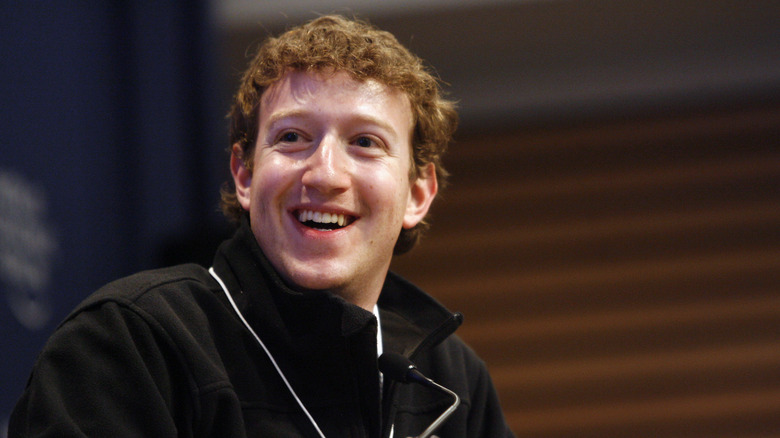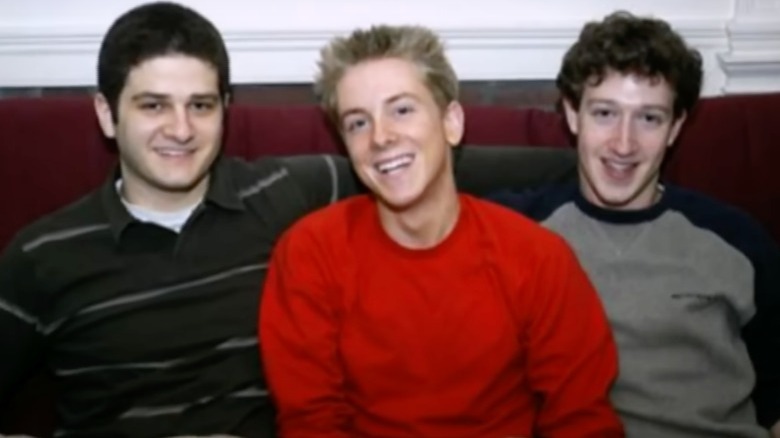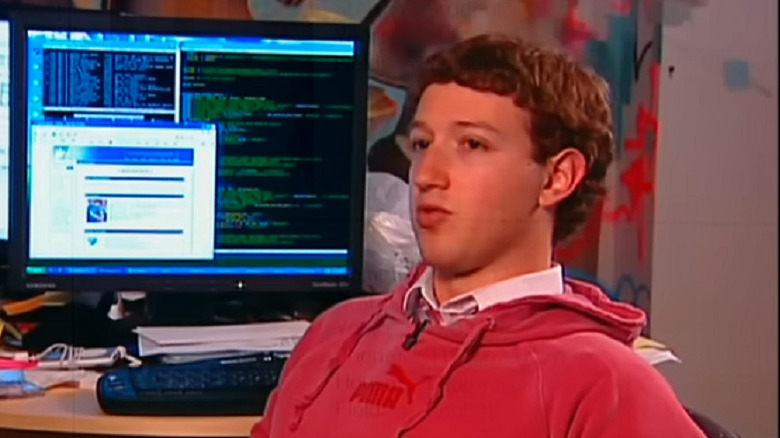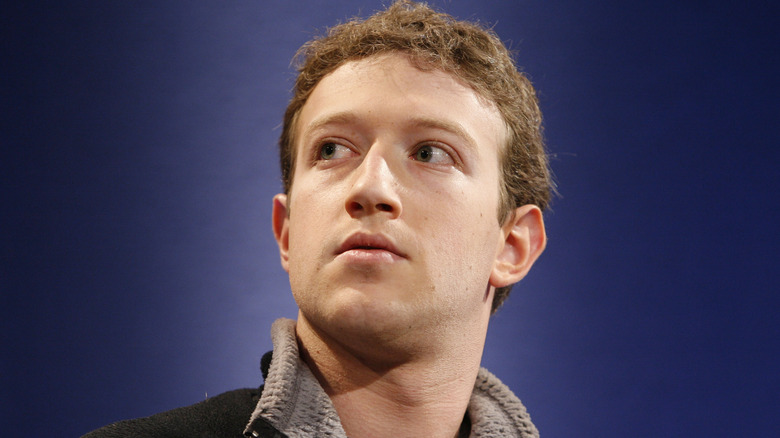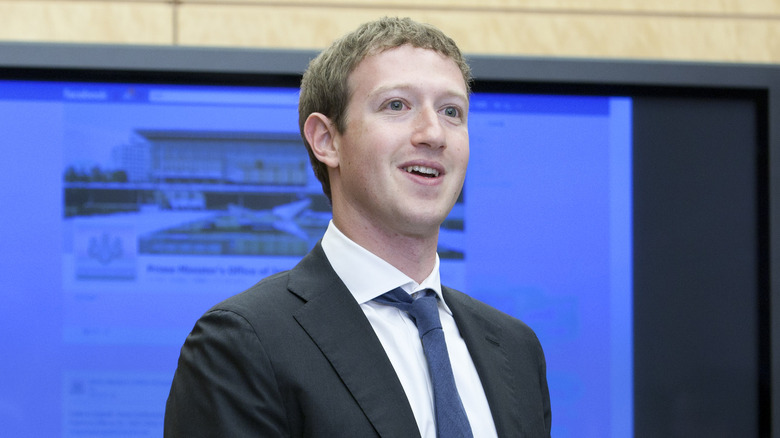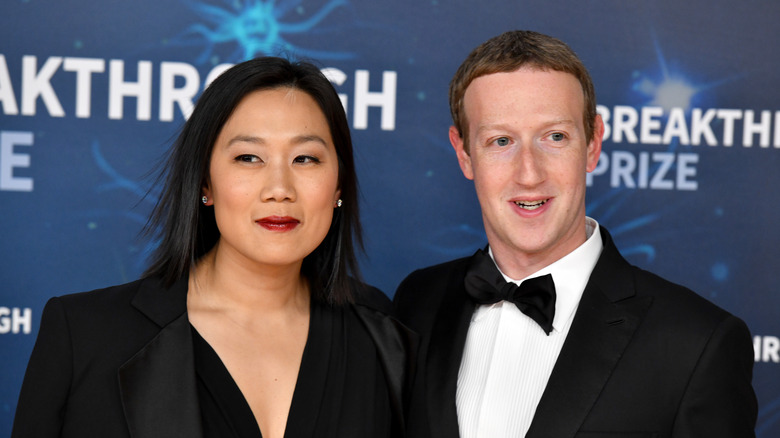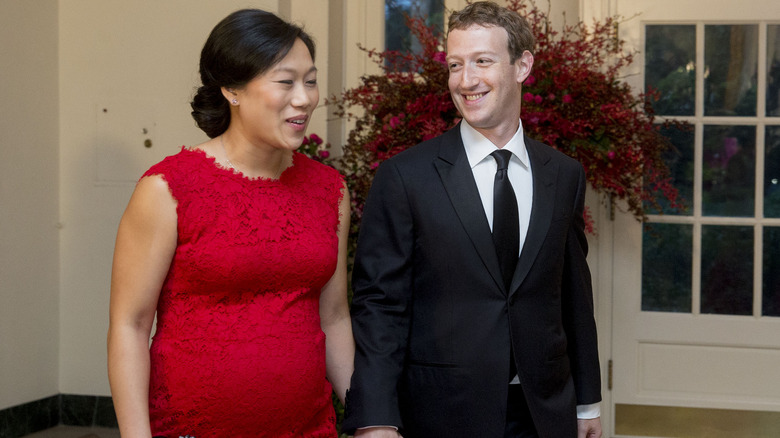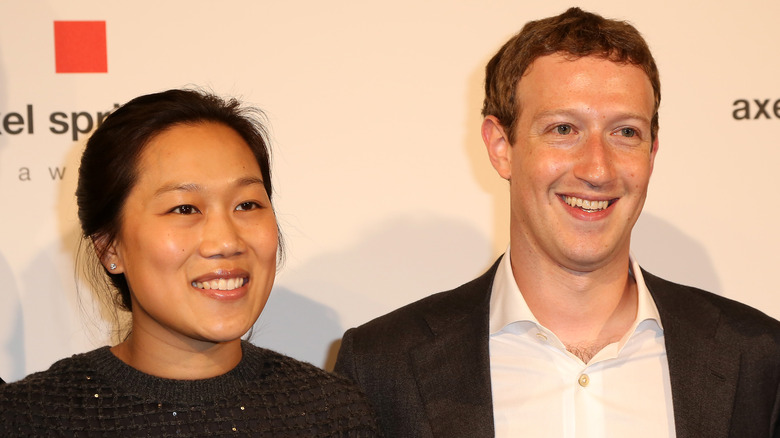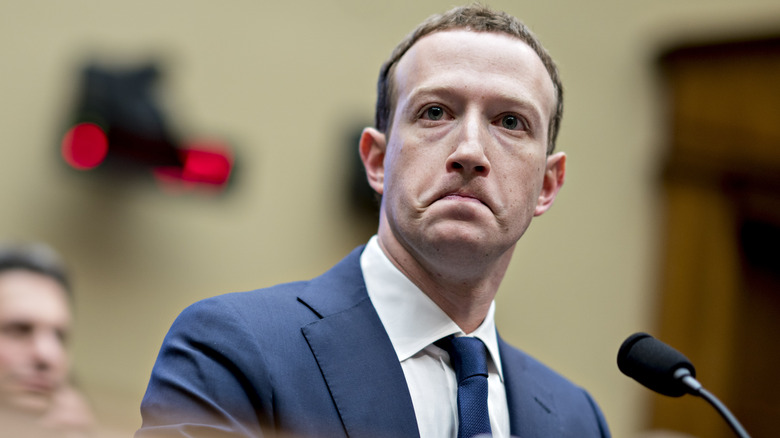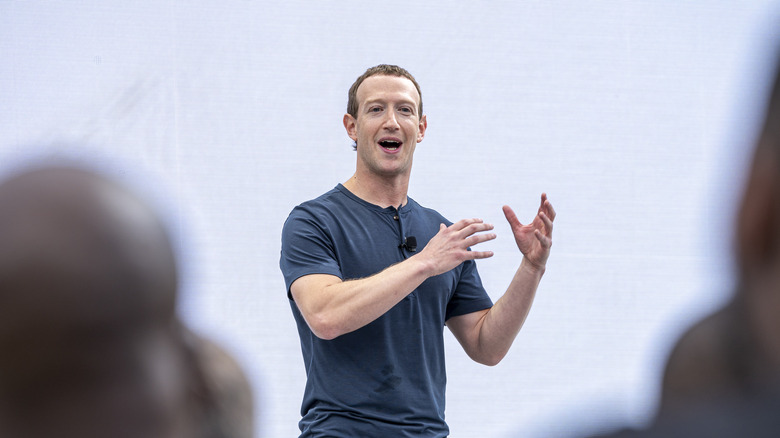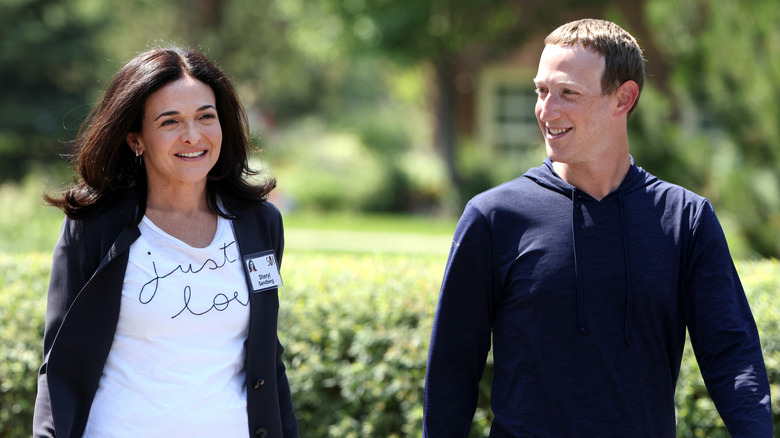Mark Zuckerberg Has Had Quite The Transformation
In the early to mid-2000s, several social networking sites grew in popularity. Friendster, created by entrepreneur Jonathan Abrams, was on a fast track to becoming the next big thing before it was dethroned by MySpace. Three years after the infamous dot-com bubble burst, Google unveiled Orkut, which took Brazil by storm with a record 11 million users over two years.
Despite the early success of these start-ups and many more, Facebook — birthed from the comfort of Mark Zuckerberg's Harvard University dorm room — stood the test of time. Speaking on the platform's longstanding global impact on "Today," Zuckerberg attributed its success to a factor that goes beyond the complexities of writing code: emotional connection. "When I look back over the last ten years, one of the questions that I ask myself is 'Why were we the ones to help to help do this?'" Zuckerberg said. "And I think a lot of what it comes down to is, we just cared more."
As the face of the giant conglomerate, Zuckerberg has come a long way since he co-founded the platform in his teens. From an early liking for computers to becoming one of the world's most influential entrepreneurs, this is the story of his transformation.
Mark Zuckerberg was raised in Dobbs Ferry, New York
Mark Zuckerberg grew up in Dobbs Ferry, New York. Mark's mother, Karen Kempner, practiced psychiatry, while his father, Edward Zuckerberg, owned a dental practice. Edward's base was adjacent to the family's living room, which meant that Mark and his three sisters, Randi, Arielle, and Donna Zuckerberg, often crossed paths with patients. Edward was ahead of his time. He was the first dentist in the area to take X-rays digitally, and it was through him that Mark got hold of his very first computer.
"I had very limited computer science background myself, being a biology major in college and then going on to dental school," Edward recalled in an interview with New Rochelle-based WVOX radio. "I did become fascinated with computers and had computers at a very early age — my first computer being an Atari 800 computer, which came with a little disk on basic programming, which I thought Mark might be interested in — and imparted that knowledge to him and from there, he took off," he said. Edward revealed that Mark went on to get a C++ programming book and used it to advance his coding knowledge.
He began a communications system named ZuckNet
Long before he co-founded Facebook, Mark Zuckerberg had already proven that he could put his programming skills to good use. Zuckerberg developed below-par games he played at home, as he shared with Masters of Scale. "I started off by making these terrible games," he recounted. "I made this game ... about a snowball fight that I could play with my sisters, and I think the graphics were literally stick figures."
His coding ability eventually extended beyond leisure and stretched into his father's dental practice. "The dentists and hygienists needed to share data on the patients," Zuckerberg explained. "So I built a system where [my dad] could communicate with folks across rooms and can also communicate with me and my sisters upstairs — and I called it ZuckNet." ZuckNet was a hit within the small community that Zuckerberg and his family had created and only got displaced when AOL grew popular in the market.
He got into Harvard and later dropped out
Before he was accepted by Harvard University, Mark Zuckerberg had the choice of going into business full-time, as his sister Randi Zuckerberg told CNN. "My dad, funny enough, right before each of us went to college, offered us the options of going to college or, like, investing in a franchise and running it," Randi revealed. Mark, she added, would have been a McDonald's franchisee.
Mark shared the moment he got his Harvard acceptance letter in a May 2017 clip posted to Instagram. The footage shows Mark — wearing pajama pants and a t-shirt — facing a desktop while his father, Edward Zuckerberg, does the recording. "Yay. I got accepted," Mark nonchalantly says, to which his father responds with an enthusiastic cheer. Mark became a psychology major, but his time at the Ivy League institution was cut short when Facebook became a success (details on this later).
In 2017, more than a decade after he'd exited college, Mark was awarded an honorary Doctor of Law degree by Harvard University. In his commencement speech, he recalled his embarrassing first lecture, a lesson on kindness. "I was late, so I threw on a t-shirt and didn't realize until afterward that I put it on inside out and backward — my tag was sticking out the front," Mark narrated. "I couldn't figure out why no one in class would talk to me. Except [for] one guy — KX Jin. He just went with it." Jin, he said, eventually worked with him at Facebook.
Mark Zuckerberg and his friends co-founded Facebook in 2004
Mark Zuckerberg and his college roommate Dustin Moskovitz first met through sheer luck when a dorm selection system put them together. Zuckerberg showed up to school with an enormous whiteboard — much to Moskovitz's amusement — but was generally relaxed, as the latter told PandoDaily. In 2004, Moskovitz was part of Facebook's five-member founding team, which included Zuckerberg, Eduardo Saverin, Andrew McCollum, and Chris Hughes. Back then, the social networking site was known as "TheFacebook," and targeted college-going students.
"It's an online directory that connects people through universities and colleges through their social networks there," Zuckerberg explained to CNBC that year. "You sign on, you make a profile about yourself by answering some questions, entering some information such as your concentration or major at school ... contact information about phone numbers, instant messaging screen names, anything you want to tell."
Moskovitz also went on to work at Facebook. Despite the portrayal of an acrimonious relationship between him and Zuckerberg in the 2010 flick "The Social Network" years later, Moskovitz maintained that he eventually exited Facebook because he wanted to start another company, Asana.
PayPal co-founder Peter Thiel invested in Facebook
Facebook's first investor was PayPal co-founder Peter Thiel. In a chat with Wired UK, Thiel revealed that Zuckerberg was tucked in his shell when they first crossed paths in August 2004. "He was 19 years old. He was very introverted [and] rather quiet at the time. He is still somewhat introverted," Thiel said. Luckily for Zuckerberg, Thiel and his partner, LinkedIn co-founder Reid Hoffman, didn't need him to talk much since they'd already researched Facebook's place in the market. "Reed had started a company called SocialNet all the way back in 1997, seven years earlier, and so we thought about this a lot," Thiel explained, adding that it took them an hour to give Zuckerberg a signed check.
Before receiving funding, Zuckerberg had every intention of returning to Harvard University. However, Facebook's growth was incredibly rapid, and he had to stay put. He realized that juggling the demands of the company and school would be a Herculean task. "Harvard lets you take time off, so we're just like, 'All right, we'll take a term off.' And then that kind of just continued," Zuckerberg told Masters of Scale.
He became the world's youngest self-made billionaire
By October 2005, Facebook had increased its target market to include high schools. Three years later, Mark Zuckerberg recruited Sheryl Sandberg, the company's Chief Operating Officer (COO). Sandberg had barely settled in when 23-year-old Mark made his Forbes entry as the youngest self-made billionaire with a reported 30% share in the company valued at $1.5 billion. At that time, Facebook had already gone global.
While Mark smiled his way to the bank and had the power to alter his parents' lives, not much changed for Edward Zuckerberg. Save for numerous questions about Mark, Edward told WVOX radio that he still practiced dentistry, related with family just as he did before, and played contract bridge.
Since 2008, Mark's wealth has soared up to $137.7 billion, placing him as the fifth richest person worldwide as of February 2024. So, what does he really think of his billionaire status? "No one deserves to have that much money," Mark told his employees in a live-streamed Facebook Q&A (via Bloomberg). "I think if you do something that's good, you get rewarded. But I do think ... some of the wealth that can be accumulated ... is unreasonable."
Facebook acquired Instagram and WhatsApp
In a since-deleted April 2012 Facebook post, Mark Zuckerberg announced that Facebook had purchased Instagram. At the time, the site boasted 30 million users, which rapidly grew to 40 million in the ten days after Zuckerberg's announcement. Facebook parted with $1 billion in both equity and cash in the acquisition, as disclosed in a press release that also mentioned the deal would close toward the end of the second quarter.
"This is an important milestone for Facebook because it's the first time we've ever acquired a product and company with so many users," Zuckerberg wrote in his post. "We don't plan on doing many more of these, if any at all. But providing the best photo-sharing experience is one reason why so many people love Facebook, and we knew it would be worth bringing these two companies together." In May of the same year, Facebook went public with a starting stock price of $38, which plummeted to $18.75 by August.
Despite the promise to never go big again, Facebook made another major acquisition more than two years later when it paid $22 billion to purchase the instant messaging application WhatsApp.
The tech mogul married Priscilla Chan
Mark Zuckerberg met his future wife, Priscilla Chan, in his freshman year at Harvard University. Chan, who was in her sophomore year, came across the would-be tech entrepreneur in a bathroom line at a fraternity party. The pair began talking. "He was this nerdy guy who was just a little bit out there," Chan said of that day in a conversation with The New Yorker. "I remember he had these beer glasses that said 'pound include beer dot H.' It's a tag for C++. It's like college humor but with a nerdy, computer-science appeal."
Zuckerberg and Chan dated, and in 2012, the couple tied the knot. Zuckerberg made the big announcement in a way a Facebook co-founder would: by changing his status to "married." The couple's low-key Palo Alto, California nuptials were a surprise for their guests and disguised as Chan's medical school graduation ceremony.
It's unclear whether or not they have a prenuptial agreement, but a 2008 book by Sarah Lacy titled "Once You're Lucky, Twice You're Good: The Rebirth of Silicon Valley and the Rise of Web 2.0" alleges that Zuckerberg and Chan had a relationship contract before getting hitched. One of the terms, Lacy claimed, was "One date per week, a minimum of a hundred minutes of alone time, not in his apartment and definitely not at Facebook." Going by a January 2024 Instagram post by Zuckerberg on date night, Lacy's allegation may not be far from the truth.
The couple welcomed their first child
Mark Zuckerberg announced the December 2015 arrival of his and Priscilla Chan's first child, Maxima Chan Zuckerberg, in a heartfelt letter posted on Facebook. "Dear Max, your mother and I don't yet have the words to describe the hope you give us for the future. Your new life is full of promise, and we hope you will be happy and healthy so you can explore it fully," Mark's letter read in part. Prior to Maxima's birth, the couple had experienced a couple of miscarriages, as Mark shared in a conversation with People en Español.
Fatherhood brought a change to Mark's schedule. On a Facebook Live session, the billionaire said, "I used to have meetings that ran really late. But now, I make sure that three times a week, I'm home to give [Maxima] a bath" (via CNBC).
Nearly two years later, the couple welcomed their second daughter, August Chan Zuckerberg, whose arrival letter — also posted to Facebook— was an ode to childhood. Mark and Priscilla announced big family news in September 2022, revealing that they were going to be parents again. Their third child, Aurelia Chan Zuckerberg, arrived in March 2023. "You're such a little blessing," Mark wrote in an Instagram post announcing her arrival.
Mark and Priscilla launched the Chan Zuckerberg initiative
In his December 2015 Facebook post announcing the birth of his daughter, Maxima Chan Zuckerberg, Mark Zuckerberg also revealed the establishment of the Chan Zuckerberg Initiative, a not-for-profit organization. "As you begin the next generation of the Chan Zuckerberg family, we also begin the Chan Zuckerberg Initiative to join people across the world to advance human potential and promote equality for all children in the next generation," Mark wrote. "Our initial areas of focus will be personalized learning, curing disease, connecting people, and building strong communities." The organization, he added, would be funded by 99% of their stake in Facebook, valued at $45 billion at the time.
Chan and Zuckerberg shared their joint decade-long plan in a 2021 promotional video. "Our mission in science is to support the science and technology that will make it possible to cure, prevent, and manage all diseases by the end of the century," Chan said. In line with the vision, the Chan Zuckerberg Initiative reached several milestones in 2023, including tracking down patients with uncommon ailments, using artificial intelligence to advance scientific research, setting up research hubs for more complex scientific work, and improving medical imaging.
Mark Zuckerberg was questioned by the senate over the Cambridge Analytica scandal
In March 2015, Texas Senator Ted Cruz announced he would run for president. In December of the same year, The Guardian broke the news that Cruz's campaign was being run with data obtained from Facebook by the now-defunct British research firm Cambridge Analytica — without users' knowledge. Two years after the initial report of the breach of privacy, Cambridge Analytica was in the spotlight again, following reports by The Guardian and The New York Times that the company had a hand in mining information from 50 million Facebook users during former POTUS Donald Trump's 2016 presidential bid.
Mark Zuckerberg responded in a Facebook post that outlined the circumstances that led to the violation. It read in part, "We have a responsibility to protect your data, and if we can't, then we don't deserve to serve you. I've been working to understand exactly what happened and how to make sure this doesn't happen again. The good news is that the most important actions to prevent this from happening again today we have already taken years ago."
Zuckerberg appeared before Congress in April 2018. At the hearing, he revealed that Facebook had no direct business relationship with Cambridge Analytica before the 2015 exposé, and he had been assured that the data obtained from users had been erased.
He announced the rebranding of Facebook's parent company to Meta
Facebook changed the name of its parent company to Meta in October 2021. Through a letter posted to Meta's website, Mark Zuckerberg chronicled the company's evolution through the years (from text to videos) and welcomed everyone to the Metaverse. "The next platform will be even more immersive — an embodied internet where you're in the experience, not just looking at it. We call this the Metaverse, and it will touch every product we build," he wrote.
Zuckerberg presented Meta's vision as one that would allow virtual presence through holograms in offices, shows, and at home, therefore contributing to effective time management and lessening carbon emissions. All this, he said, would be done at a user-friendly cost. In line with this vision, Meta launched Quest 3, a virtual reality headset retailing at $499.99 in September 2023. The company also brought Ray-Ban smart glasses into the market at a $299 starting price.
Mark Zuckerberg parted ways with his right-hand woman, Sheryl Sandberg
When Mark Zuckerberg met Sheryl Sandberg, it was through a chance encounter at a holiday party. "I was not really looking for a new job — and I could have never predicted how meeting him would change my life," Sandberg recalled in a farewell Facebook post in June 2022. That first encounter, she said, was followed by multiple dinners that eventually resulted in a job offer. The work itself turned out to be erratic at first. It was full of several meetings that never happened because of scheduling issues and advertising ideas from clients that didn't align with the company's model. Sheryl and Zuckerberg ultimately stuck to a once-a-week meeting system that allowed them to run Facebook side by side through brutal honesty.
Zuckerberg responded to Sandberg's exit with a heartfelt note posted to Meta's website that partly read, "It's unusual for a business partnership like ours to last so long. I think ours did because Sheryl is such an amazing person, leader, partner, and friend ... She has taught me so much, and she has been there for many of the important moments in my life, both personally and professionally."
Although she left the role of Chief Operating Officer, Sandberg stayed on Meta's Board of Directors. However, in a January 2024 Facebook post, she announced she wouldn't be gearing up for a May 2024 re-election.

